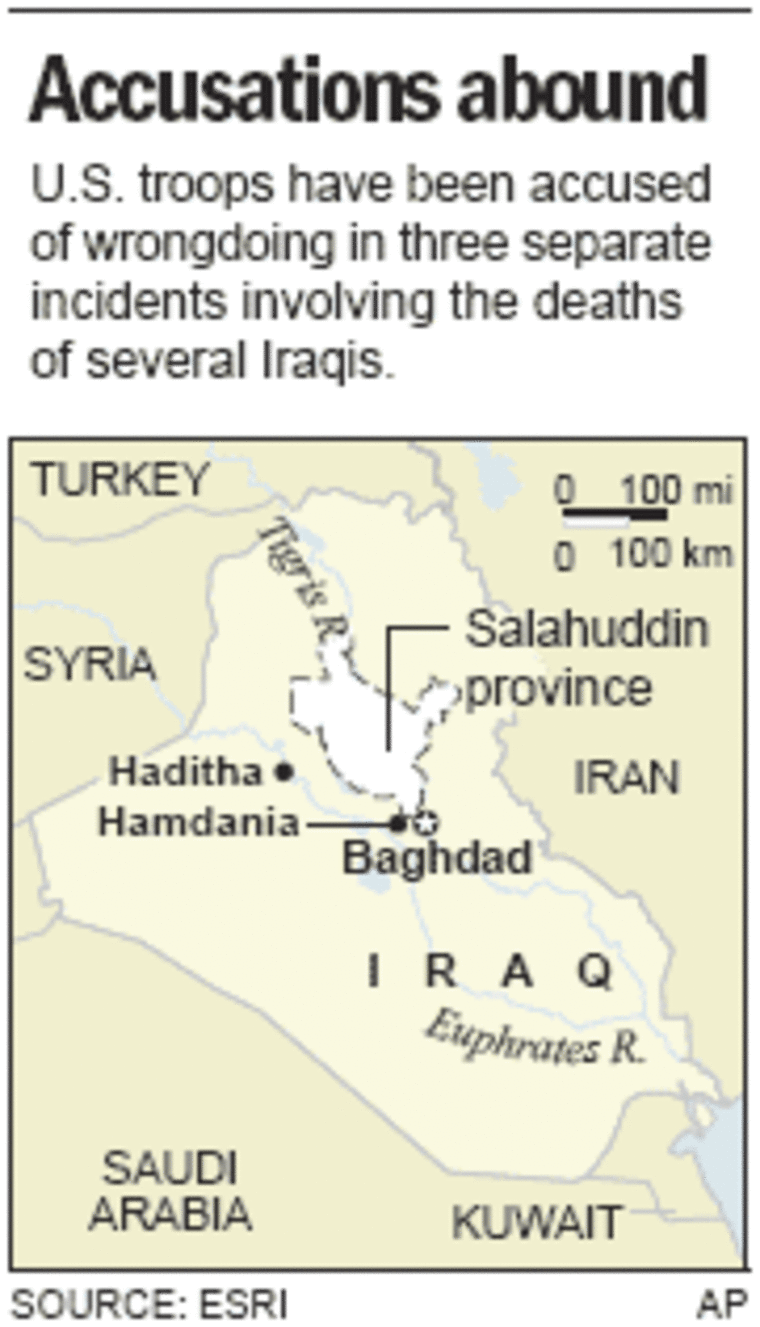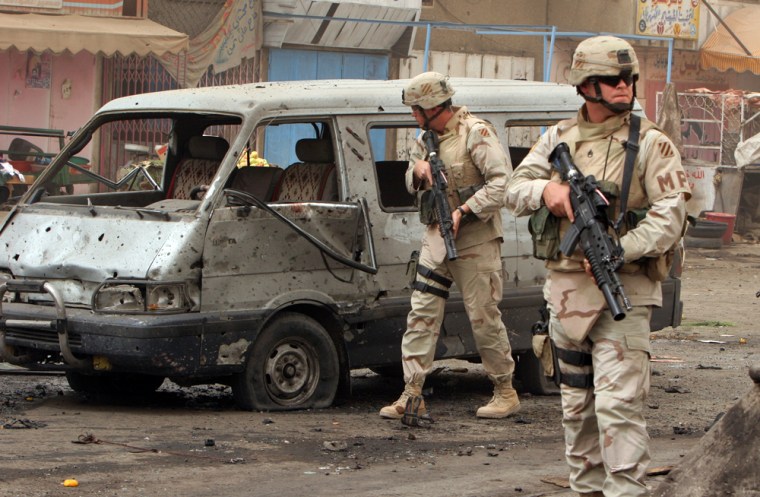The accounts are brutal: An Iraqi man dragged from his home, executed and made to look as if he were an insurgent. Three prisoners killed by their Army captors. A team of revenge-seeking Marines going home to home, shooting down unarmed Iraqi men, women, children.
The recent flurry of accusations against U.S. servicemen has stunned military analysts and experts. Many see a critical new point in the war — though few agree whether it shows the toll of combat stress, commanders resolved to stamp out war crimes, or, as some claim, an overzealous second-guessing of the troops.
But the number and gravity of the latest allegations have drawn the greatest outcry against U.S. military actions since the Abu Ghraib prison abuses.
“All of a sudden there seem to be charges right and left,” said Loren Thompson at the Lexington Institute, a defense think tank in Arlington, Va. “It clearly has happened in some cases. But it’s hard to tell whether this is a pattern of wrongdoing on our part or just a pattern of closer supervision.”
List of alleged incidents
So far, none of the troops accused in the latest cases has even been tried:
- On Friday, a Pennsylvania National Guard spokesman said two Guardsmen were being investigated in connection with the shooting death of an Iraqi earlier this year.
- On Wednesday, seven Marines and one Navy corpsman were charged in the April shooting death of an Iraqi man in the town of Hamdania. Charging documents claim the man was taken from his home, forced into a hole, shot and left with a stolen AK-47 near him to make it look as if he fought the troops.
- On Monday and Wednesday, three soldiers and a noncommissioned officer were charged in the May deaths of three unarmed Iraqis in military custody in Salahuddin province. A Pentagon official told The Associated Press that the detainees were shot while trying to flee.
Those accusations come a few months after another disturbing charge — that in Haditha, a town in the Sunni hotbed of Anbar province, members of a Marine unit killed up to two dozen unarmed Iraqis in and outside their homes after a roadside bomb killed one of the troops. Neighbors told the AP that a small group of Marines went house to house over three hours, while others stood watch.
The death penalty is a possible punishment in at least some of these cases.

“This is one of the nastier kinds of fights you could be in,” said Michael O’Hanlon, a defense analyst at the Brookings Institution. American troops “obviously lost a lot of their own compatriots, a lot of them have been there a number of times. Morale is still pretty strong, but I would think there’s a psychological toll.”
Some say that’s to be expected, but criminal behavior still must be prevented: War crimes are an indictment of leadership.
“It’s symptomatic of a combat stress management system that has failed,” said John Pike, director of Globalsecurity.org, a Washington-based military think tank.
“Anybody who contemplates a decision to use force, anybody who contemplates putting boots on the ground has to understand that part of what they’re assuming responsibility for is stressed-out soldiers are going to massacre civilians. It just comes with the territory.”
Still, Pike said that even if true, the number of abuse cases isn’t shocking, given the number of troops and three-plus years of combat: “If this is the worst that the troops have done, the chain of command would appear to have done a pretty good job.”
Blind eye opens
Others see a more emphatic message from military leaders to the troops and their field commanders.
“The system which tended to turn a blind eye is now looking harder,” said Anthony Cordesman, a former Pentagon analyst. “Incidents which in the past might’ve been covered over or dodged are now leading to formal accusations.”
Others closer to the accused are bitter over what they see as a shift from the leaders in Washington.
“There seems to be a rush to judgment,” said Charles Gittins, an attorney who successfully defended former Marine 2nd Lt. Ilario Pantano, who was acquitted of murder after he shot two Iraqis and left a warning sign on their corpses. He argued self-defense.
“The war’s being run from the Pentagon and the Pentagon’s moving with the 24-hour news cycle. There’s a tendency to charge first and let the facts play themselves out later,” Gittins said. “Back the soldiers!”
‘Nobody’s running amok’
Pantano warned against sweeping conclusions. “Nobody’s running amok and being barbarians.
That’s so inaccurate,” he said. “The real jeopardy is there’s so much blowback every time you use force that troops are dying from hesitation.”
And the latest accused soldiers have yet to be fully heard.
In Charleston, S.C., the mother of 21-year-old Pfc. Corey R. Clagett — one of four charged with killing prisoners last month — said she spoke to her son by telephone. “He said, ’Mom, this is Corey. I didn’t do those things the way they said,”’ Melanie Dianiska said.
Almost by definition, war creates chaos. Last week, Australian troops shot a civilian and a bodyguard to an Iraqi trade minister when they thought they were threatened. Two newly trained Iraqi policemen have been accused of shooting American troops. Meanwhile, two American soldiers were captured, brutalized and slain.
Losing faith
The uncertainty over the troop accusations only adds to the confusion.
“I wonder whether people have lost faith in the military because of this kind of incident,” Cordesman said, referring to the allegations against American troops. A classic terrorist strategy, he noted, is to force the enemy into atrocities, turning the local population against the opponent and sapping its support at home.
Already, this war’s mistakes are being taught as cautionary tales. The failings at Abu Ghraib are now part of a West Point leadership course, alongside Vietnam’s My Lai, where some 300 villagers were killed.
The military courts and public opinion will determine whether Haditha, Hamdania and Salahuddin join them.
